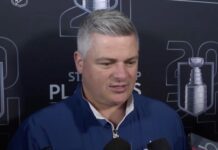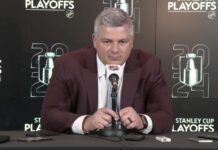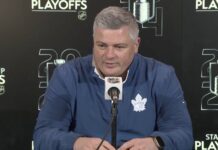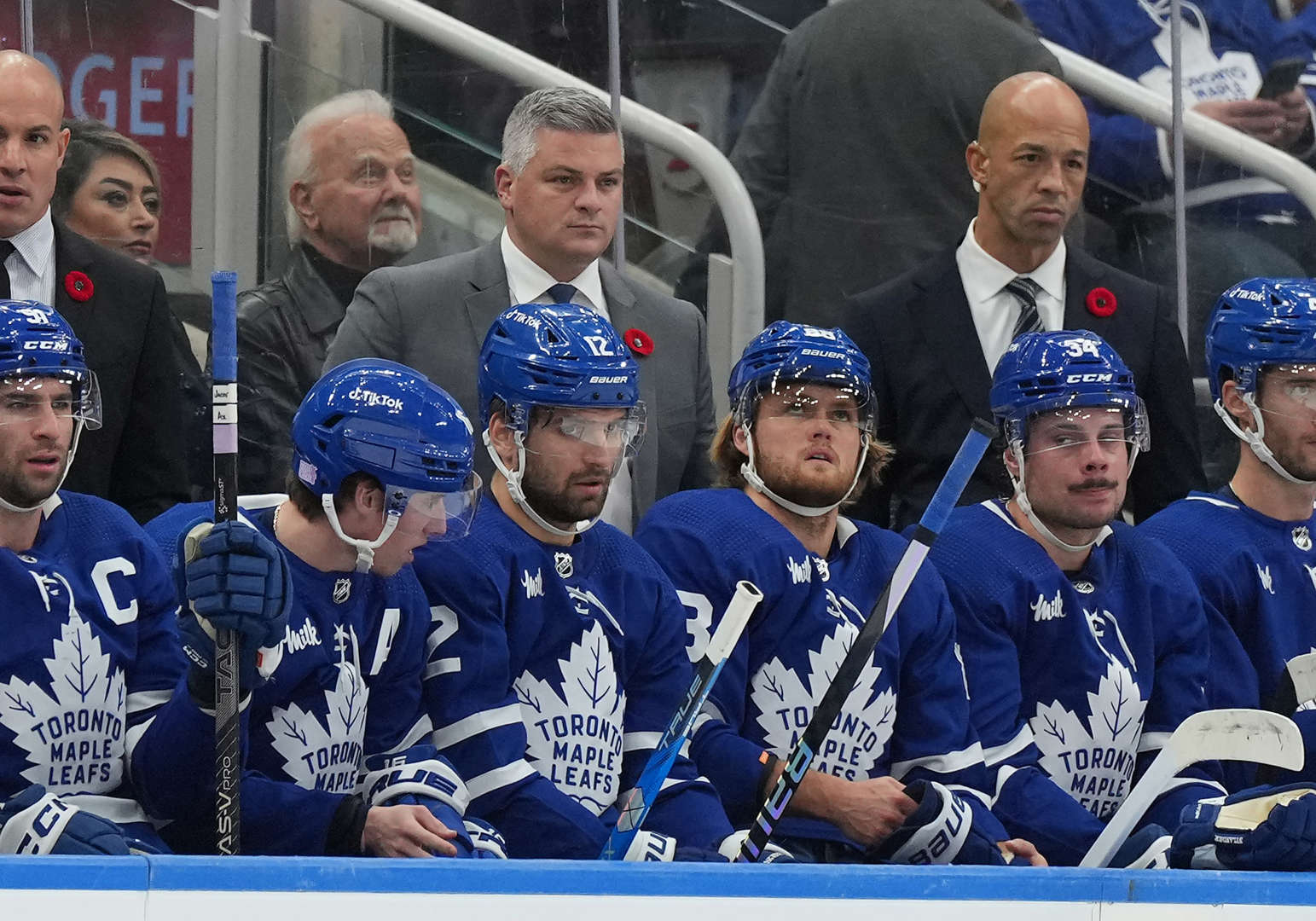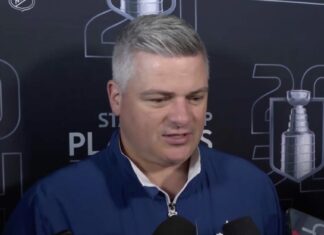Whenever there is a change at the head of the front office, a new voice almost always provides a breath of fresh air.
That was evident when listening to Brad Treliving in his introductory press conference last week (and as he made the media rounds afterward). As expected, he didn’t make any earth-shattering declarations, but he did offer some interesting comments worthy of discussion.
As things stand, the Leafs have seven forwards under contract for next season (including Matthew Knies), while Auston Matthews and William Nylander have one year remaining on their contracts. The organization’s prospect pool is shallow, and the Leafs have very few draft picks in the near future – four total in the top four rounds over the next three drafts.
You could argue the team is at an inflection point of sorts. They can push forward with this group, try to retain their stars, and continue to build around them. They can look to shake up the core group, potentially believing that they have plateaued or reached their max potential and are in need of a different mix. A major contract negotiation could break down or they could find out that the numbers don’t work before electing to go in a different direction altogether.
Ultimately, actions will speak far louder than words, but we started to receive some clarity in how the team is viewed and what we should expect in terms of its approach to the offseason.
When Treliving appeared on the Real Kyper and Bourne show, Justin Bourne asked him point blank if he believes the Leafs are a contender. Treliving gave a long answer about how entering into this year’s playoffs, he placed them in the top tier of teams and ultimately viewed them as an elite club:
“It is a long way of answering that they’re an elite team. Now, as we sit here today on June 1, there are some question marks in terms of UFAs and people who are contracted or not contracted for next year. With that core of players and where the team finished off, it is a really good team, but there are areas we have to address.”
While the Leafs moved on from Kyle Dubas, Brendan Shanahan made it clear that he was generally happy with how the team was being run and how management went about their business. He did, after all, try to retain Dubas at first. That doesn’t mean that everything is perfect and no changes are forthcoming, but by and large, the Leafs President clearly believes the team is going in the right direction. Only Boston, Colorado, and Carolina have accumulated more points than the Leafs over the past three regular seasons.
When the interview process unfolded, we had given a few veteran names of note to consider, such as Doug Wilson and Mike Gillis. It should be said, on the flip side, that the names we threw out haven’t been GMs in years whereas Treliving has been one for the past seven years and won’t be missing a beat.
It takes time to reintegrate into the NHL, to build relationships with a revolving door of GMs across the league, to have your finger on the pulse in terms of player movement and prospect pipelines across the league, and to evaluate pending free agents.
You can’t wade into this job by dipping your toe in the water. The first question Treliving was ever asked as GM of the Maple Leafs was whether or not he had spoken to Auston Matthews about contract negotiations. He has to hit the ground running given the team’s situation; the recent experience as a GM in the league helps, and his experience in Calgary should align with the mandate of trying to win right now.
The decision on Sheldon Keefe, and the possibility of “running it back” with the core + coach
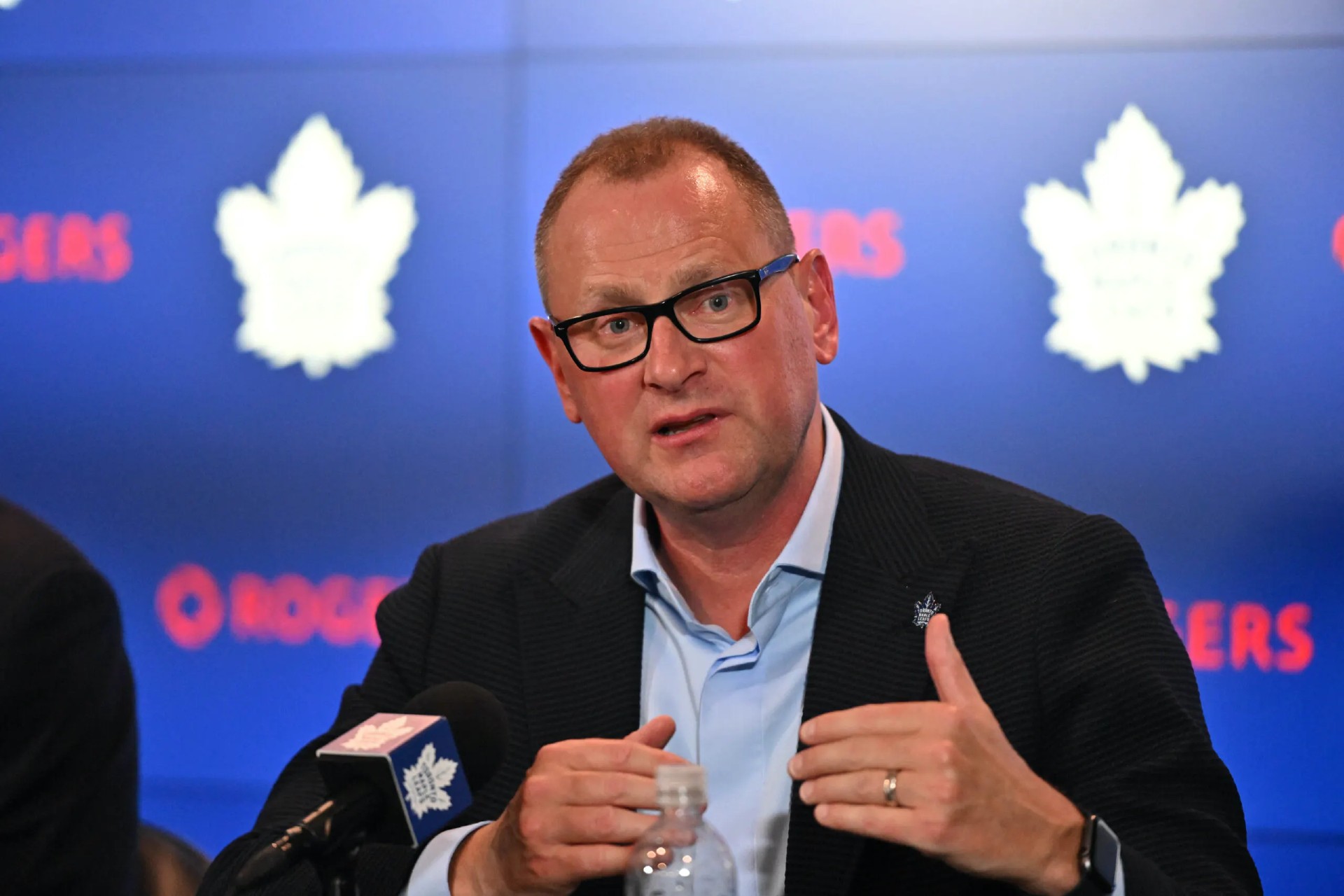
Part of trying to win right now involves making a decision on head coach Sheldon Keefe. Treliving certainly left the door open for him to return:
My view: In determining whether a guy is good, bad, or indifferent, you have to get to know him. You have to work with him. We are going to sit down and go through it.
It is fair to want to get to know someone first – or at minimum feel out the situation. The regular-season record is impressive, but the playoff track record is not. I’d argue the Leafs have been outcoached and/or net neutral in all five of the playoff series Keefe has coached.
We’ve referenced this a few times, but the team plays really slow and refuses to create offense from the points, which are two elements a team needs to have success in the playoffs. Even just managing the gamesmanship of a playoff series has been poor; it’s not the coach’s fault that the Leafs aren’t getting calls as their players get mauled, but you can certainly wield the power of the podium to sway the narrative in a way that’s matter of fact without whining. Paul Maurice seemingly did exactly that against the Maple Leafs.
You can’t rush the process of figuring out your coaching situation, but part of that process is gauging the market, and the Leafs probably missed the boat on the coaching market in recent years. There are some interesting names out there right now – as always – but all of Bruce Cassidy, Pete DeBoer, and Barry Trotz were on the market last offseason. This summer, the cast of candidates doesn’t shine quite the same way, with names like Gerard Gallant, Darryl Sutter, Peter Laviolette, Bruce Boudreau, and perhaps even Claude Julien among the candidate pool.
While we could identify coaches without NHL experience, so far Brad Treliving has only hired coaches with previous NHL head coaching experience. When he let go of Glen Gulutzan in Calgary, he specifically stated, “I think having experience in this league is critical.”
This limits the team in its options, but if you fancy yourself a contender – and the Leafs clearly appear to – then history is not on the side of the rookies. The only rookie head coach to win a Cup in his first year in this millennium is Dan Bylsma, who was hired mid-season. There have been other coaches with fairly limited experience prior to winning it all such as Randy Carlyle, Peter Laviollete, and Jon Cooper, if we want to stretch the margins here. Frankly, they all did it in markets that are much less scrutinized. Experience in this market is as much about being able to read the situation and identify when to make the necessary adjustments (or when to not make any adjustments) as it is about having the courage of your conviction while every move is heavily scrutinized.
The next point to consider with the coaching staff (already having lost one member of that group) is that, by all indications, the Leafs appear ready and content to run the core back. If they run back the core and the coach, what are they banking on to get them to the next level? That the coach and core learn from their experiences and everything breaks just right? That Matthew Knies walks in and is a difference-making star that adds another dimension to the team? Or that Joseph Woll emerges as a high-end goalie (or even that Ilya Samsonov continues to ascend)?
It’s hard to justify simply running back the same group – from the coach on down – year after year while believing it will finally be different this time and they will go on a run of consequence when every spring looks and feels eerily similar. You can’t just say the other goalie was good every year. You have to get traffic and pucks to the net and grind through games.
Treliving actually addressed this point in a roundabout way:
“In the playoffs, you have to be able to play in a number of different ways and be able to engage — not just accept — and be proactive in putting your game against an opponent. You have to be able to handle different styles of play. Do we look at our defense, and are there ways we can augment that?”
There are so many notes in there that ring true. For years, we have routinely talked about how this Leafs team starts games slowly – often with a timid demeanor – and how they dip their toes in the water. Unless they somehow manage an early goal, they don’t really do anything to build in-game momentum and impose their will on opponents.
The Leafs also need to be able to win in different ways, and while so much talk has centered around their lack of physicality, it should be noted that while they did try to become tougher around the edges of their team, they got slower in the process and still ended up being not particularly physical – because their top players aren’t – while not being particularly fast or full of skill, either. It was more of a master-of-none situation that their elite players could cover over at times rather than a diverse group that can win in various ways with an ability to dictate play in a specific way.
The Leafs were second last in goals by defenseman as a team this season, with only Vancouver ranking lower than the Leafs’ 27 goals. Their number two defenseman in ice time, TJ Brodie, played over 23 minutes per night in the playoffs and put nine total shots on net through 11 games. He actively passed up open shots on net and deferred to teammates as much as possible. They were non-existent offensively from the back end save for the often individual brilliance of playoff Morgan Rielly.
Conor Timmins flashed offensively with 14 points in 25 games. He has always been a highly-touted, skilled defenseman and maybe there’s something there. Timothy Liljegren has more to give (he actually led all Leafs defensemen in goals during the season). Morgan Rielly remains a high-end offensive defenseman. Part of this is coaching in that they have actively tried to avoid creating offense from the point.
There is some cap space to work with and only seven forwards are under contract, so they can remake the group – and by extension, the team – to some degree. However, if they run back the core and the coach, how much is really changing?
Elliotte Friedman noted that the organization believes too much of the conversation has centered around the core four and they want to have more focus on the overall team and finding identities for players throughout their lineup. Brad Treliving even publicly addressed this already, emphatically noting, “Quite frankly, it is not about four. I don’t want to hear that term. This is the Toronto Maple Leafs. It is not about one, two, four, or five guys. It is about 23-24-25 guys on our team.”
Is the main change supposed to be that the Leafs are de-emphasizing that core – externally and internally – while also changing the mix around/alongside them? And can Sheldon Keefe be the leader of this evolution? The head coach has routinely loaded the stars with ice time no matter how they’re playing and has been trigger shy when it comes to criticizing them (and quick to walk it back when he has). Even at the start of the playoffs, when they had acquired some legitimate forward depth, what was the first thing they did? Try to load up Ryan O’Reilly on the second line, leaving a predictably weak third line, and the team just got ran over. Only after that were they forced to change. Would new leadership up top – perhaps pushing for more accountability – change this dynamic? Or is there going to be a disconnect in approach and philosophical beliefs?
In Pittsburgh, it was noticeable that Kyle Dubas instantly stated, “If people want to bet against Mike Sullivan, Sidney Crosby, Evgeni Malkin, Kris Letang, and others, they can go ahead and do so, but I am going to bet on them and go with them here.” He further emphasized that Mike Sullivan, “can coach forever. He is a great coach. There is no real expiration date on Mike.” This all sounded eerily familiar to his approach in Toronto.
The draft and free agency are fast approaching, but Treliving was quick to state, “Number one, I have to get out and see Auston. #2 or #1A is the other contractual issues. We have a coach that we have to get some clarity and meet with.” He’s right in that the team needs clarity from their franchise center and to make a decision on the coaching situation. These are not easy discussions or decisions, and when they wrap up, they don’t get much easier afterward as they will need to sign free agents just to fill out their roster, even if they do elect not to trade anyone.
Lots to work on, and little time to accomplish it.


